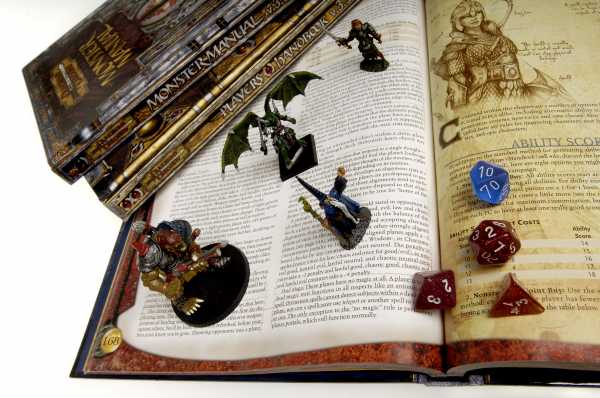
Tabletop role-playing games like Dungeons & Dragons, long stereotyped as the provenance of geeky shut-ins, are having a moment. They’ve spurred big, hit podcasts. They’ve been featured on TV shows. And they’ve spawned more than a few trend pieces in the media about how tabletop role-playing games like Dungeons & Dragons are having a moment.
Sarah Whitten at CNBC explains:
RPGs have moved beyond their typical audience, to say the least. I’m frequently surprised to learn that a friend I never would have expected to be into D&D is playing in a campaign with other friends, often thanks to the magic of video conferencing software. After all, the game allows players to use a system of rules to tell a story together, rolling dice to resolve conflicts and playing out scenes that take place between their characters. And what’s more fun than telling a story with your friends?
But so much of the chatter about Dungeons & Dragons and the tabletop RPG boom has obscured a very real issue that potential players might face: Many RPGs have a steep learning curve, and the medium itself isn’t always the most user-friendly. Dungeons & Dragons is a fun game, but to get the most out of it, you need to have at least a few people at the table who really know what they’re doing and understand the rulebook backwards and forwards. That level of preparation often intimidates newcomers.
So thank goodness that the boom in tabletop RPG fandom has coincided with a boom in terrific, well-designed RPGs that are perfect for beginners, many of which you can play with a handful of dice or a deck of playing cards. Plus, tabletop RPGs are eminently easy to play over video chat services if you can’t gather with your friends in person — something that RPG fans have known for ages and that many folks are newly discovering in this age of sheltering in place.
Even better, websites like Roll20 and numerous others have sprung up online to support RPG groups by offering digital versions of core rulebooks and virtual dice to roll. That makes it far easier to gather with friends online to tell stories together, whether you’re several time zones apart or just staying at home. And even if you’re not on Roll20, the vast majority of RPGs are available as PDFs you can instantly download from sites like DriveThruRPG, and there are plenty of virtual dice simulators out there. Having a printer with which to print out character sheets and other materials is helpful but not strictly necessary.
Related
How to play Dungeons & Dragons and other pen-and-paper games without leaving home
If you’d like to dive into this increasingly popular world, here’s your guide to becoming an RPG expert, from orientation to advanced level classes, with plenty of fun to be had along the way.
Orientation: Getting your feet under you
Listen to an RPG podcast: If you’re testing the RPG waters and not quite sure what these games are all about, allow me to recommend any of the great RPG podcasts out there. Most are focused on Dungeons & Dragons, as it is, after all, the most popular RPG of them all. But there are plenty of great podcasts focused on other games as well.
My favorite is James D’Amato’s One-Shot, which tells a short story in a handful of episodes, each time using a different game. You’ll hear the players fill in the details of the story but also hear them work through the actual game mechanics, creating characters, rolling dice to overcome challenges, and so on. It’s a great way to get a sense of the full breadth of what the RPG world has to offer and a great way to get a crash course in RPG rules.
And if that’s not to your liking, consider The Adventure Zone, the absurdly popular (and good!) RPG podcast from podcasting super-family the McElroys (it’s mostly Dungeons & Dragons, though other games are played); Join the Party, my favorite of the D&D podcasts; and Friends at the Table, which covers a variety of games and takes a storytelling-first approach, putting interesting characters and worlds ahead of the games themselves.
For the Queen: Designer Alex Roberts is one of the RPG creators whose work most excites me right now, and For the Queen is her best game. It almost feels more like a card game than it does an RPG. You and a group of friends — ideally four or five, but the game scales both smaller and bigger remarkably well — are a party traveling alongside a queen on a very important mission. Each player draws a card that asks a question, about either who the player is or who the queen is, then answers that question, in as much detail as they want. Slowly but surely, both the characters created at the table and the queen — who is played by no one but described by everyone — are fleshed out, until someone draws a card that says the queen is under attack. Do you defend her or betray her? That’s up to you.
For the Queen is an excellent introduction to RPGs because it uses a mechanic almost all of us are already familiar with — drawing cards — in service of the core idea behind RPGs: telling a story together. And if you don’t want to tell a story about a fantasy queen, the game allows you to tell a story about, say, a homecoming queen or a queen bee or a drag queen without any trouble. Your imagination is the only limit. It’s a game that makes telling a great story feel almost easy.
If you like For the Queen, also try Roberts’s other big title, Star Crossed, a two-player game that simulates a romantic story using a Jenga tower.
(Buy For the Queen here.)
For beginners: Quick and easy RPGs for those just starting out
Fiasco: For years, Fiasco was my “get newbies into RPGs” game, and it’s still one of my go-tos, even now that I have For the Queen. Created by indie RPG designer (and superstar) Jason Morningstar, Fiasco uses a variety of playbooks that contain potential details for characters and places in a chosen setting. Settings range from a worn-down spaceship to backstage at a high school play to a very loose riff on The Muppet Show, and the game always tells a story of things going very wrong, as characters hatch a crazy scheme, then watch it all fall apart around them. Fiasco beautifully simulates the mass chaos of a movie by the Coen brothers, without boasting complicated mechanics new players will struggle to learn.
If you like Fiasco, also try Morningstar’s Winterhorn, a sobering look at how governments undercut activist groups via infiltration.
(Buy Fiasco here.)
The Quiet Year: My favorite RPG designer is Avery Alder, who’s created an astonishing number of great games and whose every release — even if it’s a deeply simple RPG designed to be played by one person in a few spare moments — shows immense thought and care.
For my money, The Quiet Year is her masterpiece. The 2012 release takes place on a post-apocalyptic Earth, among a small band of people who’ve survived some terrible cataclysm. Using a deck of regular playing cards, players answer various prompts (each tied to a different card) and sketch in a map together of the community these survivors form. Still, every game ends the same way: with the arrival of renewed destruction. The Quiet Year works because it’s so simple that anybody can pick it up and play it, yet it also encourages meditation on community, survival, and mortality.
If you like The Quiet Year, also try Alder’s Dream Askew, which is similar but much more focused on queer communities trying to survive in oppressive situations.
(Buy The Quiet Year here.)
Masks: The vast majority of RPGs take the form of a narrator — often called a game master or dungeon master — guiding players through a world the game master has constructed, with the players rolling dice to overcome obstacles they might encounter. In general, my tastes run toward games that give players as much power to construct the story as possible, which might be why I prefer games referred to as “Powered by the Apocalypse” (or PBTA — it’s named after the rule system developed for the game Apocalypse World, which has since been ported to numerous other games).
In PBTA games, players roll two six-sided dice (or D6s) to determine whether they succeed or fail at tasks set for them by the game master. The GM, in turn, keeps things moving and tries to preserve a modicum of continuity. But the players also have extreme amounts of leeway to help shape the world and their relationships with other characters. That stripped-down simplicity makes PBTA games a natural fit for people spreading their wings either as players or game masters.
One of my favorite PBTA games — and a great one for beginners — is Brendan Conway’s Masks, which asks players to sign on as a teen superhero in training. While the focus is on superheroics, it’s also on teens being teens and feeling things too deeply and making stupid decisions. Even as an adult, wrestling with those big emotions can be tremendously fun. And with superpowers involved, all of those very teen moments are heightened and blown way the fuck up. Add to that the idea that the players at the table are supposed to be coming together as a superhero team, and you have a recipe for disaster — in a fun way, of course.
If you like Masks, also consider trying any of the scores of other PBTA games, but particularly Apocalypse World, Dungeon World, or Monster of the Week. And, hey, if you want to watch me play Masks, there’s a whole campaign of me doing just that with some friends available here.
(Buy Masks here.)
For intermediate players: More involved games for those who want a more complex experience
Dungeons & Dragons: I rarely recommend that would-be RPG players begin their experience with Dungeons & Dragons, which involves a fair amount of number-crunching and stats, even in its most streamlined versions. (If you’re new to the world of D&D, the most recent fifth edition is probably the most stripped-down version of the game, and a good place to start.) D&D also requires a bunch of dice you might not have (though you could always download a virtual dice roller for that) and a dedicated game master who knows the rules back and forth.
But you know what? I’ve had many friends get into RPGs via D&D, so maybe my reluctance is misplaced. For one thing, the sheer number of rules and stats often proves more welcoming to new players who want to know exactly what to do at every turn and are less comfortable with improvisation. For another, the game features a lot of combat, and “I hit the kobold in the face with a mace” is an easy answer to leap to when presented with a thorny dilemma. For yet another, to much of the public, Dungeons & Dragons is synonymous with role-playing, making it a seemingly natural place to start.
I still hesitate to recommend it straight off, but if you have a friend who knows the game well and is willing to serve as game master — go for it. You’ll probably have a lot of fun.
(Buy Dungeons & Dragons here.)
Microscope: One of my favorite sub-genres of RPG is a game dedicated not to telling a story but building a world. These sorts of games attempt to take a high-level view of a place, digging into what makes it tick, often across centuries or millennia. My favorite designer in this category is Ben Robbins, whose Microscope is a must-play for those who think world-building sounds fun.
Using a series of index cards, players chart the history of a world, from one point to another point, and each development can be as granular as you like. (If you’re using our own world as a setting, for instance, you might try “from the extinction of the dinosaurs to the rise of the first city” or “from World War I to World War II” or “from last Monday to today.”) Then, they dig in with more detail, fleshing out the world as much as they like. Sometimes, it might even become the setting for a session in another game entirely.
If you like Microscope, also try Robbins’s own Kingdom, Caroline Hobbs’s Downfall, or Kimi Hughes’s Decuma. (Hughes is a friend of mine. Decuma is not yet commercially available, but it’s great and will be available soon.)
(Buy Microscope here.)
Blades in the Dark: Outwardly, Blades in the Dark has a lot of similarities to a PBTA game, but its mechanics actually operate significantly differently, in a way that allows for greater improvisation at the table between the game master and players, but also in a way that is slightly more convoluted and not recommended for newer players. These mechanics are different enough from PBTA that they have their own name — Forged in the Dark (FITD) — and have spawned a fleet of other games that use the same approach.
Designed by John Harper, Blades in the Dark takes place in a fantastical city of Harper’s own invention, where rival criminal gangs compete to pull off gigantic heists. The game allows for players to reveal, when confronted with a seemingly insurmountable obstacle, that actually, they planned for that, by inserting a quick flashback scene on the fly. It’s incredibly fun when a game master knows the game inside and out, but can be hard to wrap your brain around if they don’t.
If you like Blades in the Dark, try other FITD games like Scum and Villainy (set in space) or Band of Blades (a military fantasy).
(Buy Blades in the Dark here.)
For advanced players: These games will be better the more experience you have
Girl Underground: Girl Underground, designed by Lauren McManamon and Jesse Ross, uses one of my favorite increasingly popular RPG mechanics: a character the entire table controls. On its surface, this game is just another PBTA game, themed around a young girl who falls into a magical world and meets companions there who help her find her way back to our world. (Think Dorothy, Scarecrow, and so on from Wizard of Oz.) But McManamon and Ross have come up with an ingenious way to get everybody at the table invested in the fate of that girl, who is the story’s protagonist: Everyone takes turns playing her.
It’s often tricky to get an entire table invested in the journeys of each and every character. Girl Underground’s solution is to create one character everybody plays, then have that character be interested in all of the others. The mechanics of the game are simple — they’re the same as those of other PBTA games — but the trick of switching between playing the girl and playing one of her companions could prove complicated for a new RPG player. (My other favorite “shared character” game, Stonetop, in which all of the players come from the same town and, thus, control the fate of that town, is not yet commercially available.)
(Buy Girl Underground here.)
Fate: Most role-playing games provide a loose world and set of characters that the players can expand in any direction they want. But a handful of games offer players a base set of rules, then invite them to imagine absolutely anything they want. Such is Fate, a game that simply offers a series of mechanics intended to allow you to create any experience you can imagine. It’s almost too much freedom for some players, especially those who long for something more structured. But if all you want is an experience that can be anything at all, Fate can be a ton of fun. (Mike Olson, who worked on the most recent edition of Fate, is a friend of mine and also the person who got me into RPGs in the first place.)
(Buy Fate here.)
Vampire: The Masquerade: Sometimes you might want something more akin to, but still different from, D&D — different circumstances and a different setting, for example, while still having lots of rules and mechanics and stuff to fiddle with. There are plenty of games in this vein — generally called “rules-heavy,” compared to the “rules-light” games that mostly occupy this list — but my favorite is Vampire: The Masquerade. A classic from the early ’90s, Vampire: The Masquerade goes out of its way to force you to think and play like a vampire, by making you think about how long it’s been since you drank blood and so on. But the game also has a rich mythology and vampire world to futz around in, and experienced RPGers will probably get a kick out of being a blood-sucking ghoul.
(Buy Vampire: The Masquerade here.)
No matter what level of RPG player you are, remember that all of the games above are just starting points. If you like any of them, dive into other games like them or try out another game on the list. There are so many RPGs, and so many of them are good. Grab some friends, and hit the table, real or virtual.
Sourse: vox.com






